Archive for September, 2014
27 Sep 2014

Heaven666:
A white tiger at the New Delhi Zoo has attacked and killed a young man inside the tiger enclosure.
There are mixed reports as to whether the young man jumped, or has accidentally fallen into the enclosure, and even the age of the individual. However, the most credible reports indicate the young man was an Indian student who slipped while taking photo’s.
National Zoological Park spokesman Riyaz Ahmed Khan said the man ignored repeated warnings that he should not get too close to the outdoor enclosure and climbed over a knee-high fence and small hedges.
Authorities eventually frightened the tiger into a small cage inside the enclosure. Police arrived on the scene “very quickly”, but could not save his life. The man, whose body remained in the outdoor enclosure two hours after the attack, was dead by the time help reached him, Mr Khan said.
Deputy Commissioner of Police M.S. Randhawa identified the man only as Maqsood and said he was thought to be about 20 years old…
———————–
The Daily Mail says that Maqsood was drunk.
26 Sep 2014

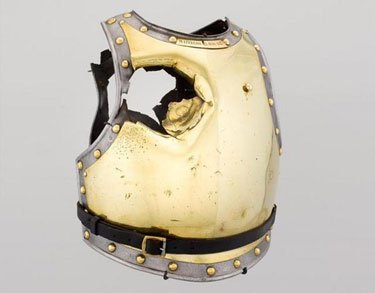
Cuirass of Carabinier Antoine François Faveau worn in the Battle of Waterloo, 18 June 1815.
Ronald Pawly, Napoleon’s Carabiniers:
The visitor to the Army Museum at Les Invalides, Paris, who walks into the room devoted to the 1815 Campaign and the Restoration is confronted by a dramatic relic taken from the battlefield of Waterloo. In a display caninet stands a handsome polished cuirass of brass-plated steel, expressing the martial glamour of Napoleon’s Army — except that a huge hole is punched through both breast and back plates, where a 6-pound cannonball smashed its way through the trooper’s right chest and shoulder.
The sight of this ruined armour, now engraved with the date “18 juin 1815”, is extraordinarily moving, and the visitor cannot help imagining the fate of the 23-year-old Carabinier Antoine François Faveau, who wore it on that fatal Sunday. He rode with the 2nd Company, 4th Squadron, 2nd Regiment of Carabiniers — one of only two regiments to wear these gleaming brass-faced cuirasses. Brigaded together, these two regiments took part in the last desperate charge sent by Marshall Ney against the stubborn British infantry squares.
———————
Wikipedia on the Carabiniers-à-Cheval:
[After 24 December 1809:] the uniform of the carabiniers: white costume, double steel cuirass (breastplate and backplate) covered with brass sheathing (copper for officers), helmet with a peak and which covered the back of the neck, with a golden-yellow copper crest decorated with a chenille made of scarlet bristle. Their armament included a carbine, a sabre (straight-bladed before c. 1811, then “a la Montmorency” – with a very slight curve) and a pair of pistols.
Hat tip to ClassicPics (Twitter) via Karen L. Myers.
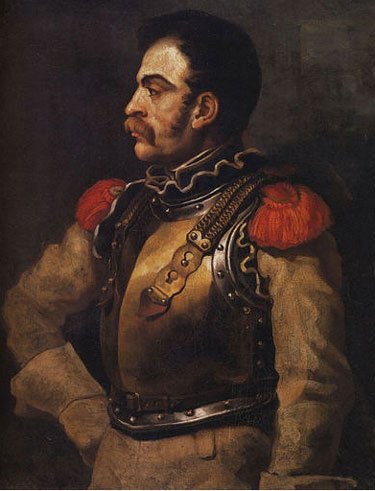
Théodore Géricault, Portrait of a Carabinier-à-cheval, c.1812, Louvre
26 Sep 2014
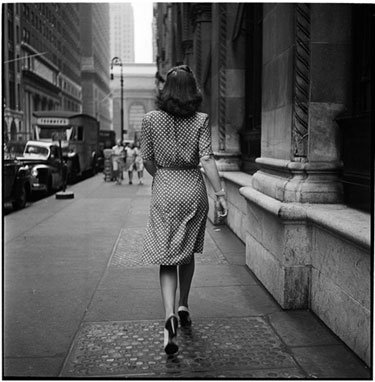
From Flavorwire.
[B]efore he became famous for directing films like A Clockwork Orange, Lolita, and Dr. Strangelove, Stanley Kubrick was a poor kid from the Bronx who worked as a photojournalist for Look magazine. (He was their youngest staff photographer on record.) Kubrick’s striking black and white images of 1940s New York City — which were often shot on the sly, his camera concealed in a paper bag with a hole in it — hint at the dark beauty and psychological drama of his later creative output.
25 Sep 2014
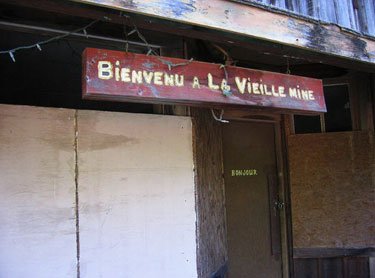
NPR identifies another case of linguistic non-assimilation, one apparently on the verge of expiring.
Language lovers and locals of an isolated mining region of the Ozarks are scrambling to preserve what’s left of a dialect known as pawpaw French before it fades. The dialect once dominated this community in southeastern Missouri, but now, it is barely a whisper. …
Pawpaw French — named after a local fruit-bearing tree — is a linguistic bridge that melds a Canadian French accent with a Louisiana French vocabulary. The French originally settled Old Mines around 1723, back when the area was part of upper Louisiana. Floods of workers from Canada and Louisiana came to work the lead mines.
The dialect faded in other nearby towns like De Soto and Bonne Terre and Ste. Genevieve a long time ago. Pawpaw French persisted in Old Mines because it is much more remote.
25 Sep 2014


The portion of the national commentariat viewing reality from the Right has been giving Obama hell for two days now for returning a salute from a pair of Marines while holding a container of coffee in his hand. Examples at Twitchy.
All this demonstrates just how few of the intelligentsia, on either side, have any real personal contact with matters military. The commentariat doesn’t realize that a salute is a honor normally exchanged by uniformed members of the military. Saluting is actually a privilege. Prisoners in the brig, for instance, are not entitled to salute.
Customs of saluting vary among the various branches of the American military. The Marines saluting Obama, like the Navy, only salute when in uniform and wearing their cover.
It is appropriate for American military personnel to salute Obama in his capacity as commander-in-chief. The president, however, is never attired in uniform and moreover does not wear a cover. He is actually, in fact, not entitled to salute.
It is understandable, of course, that presidents generally, not only Obama, feel a human obligation to try to respond to military salutes, but they are actually wrong, and violating proper military etiquette, by trying to salute at all, coffee cup or no coffee cup.
In his capacity as commander-in-chief, any president actually does possess the power to amend military customs and etiquette and to award himself and other occupants of his office the right to return salutes when not a serving member of a military and when not in uniform and not covered, but until some president formally creates that right, they are all wrong to around saluting.
Wikipedia entry on the salute
Apparently, it was Ronald Reagan who started saluting.
This article suggests that maybe Ronald Reagan really did, sort of, kind of, officially modify military custom.
25 Sep 2014

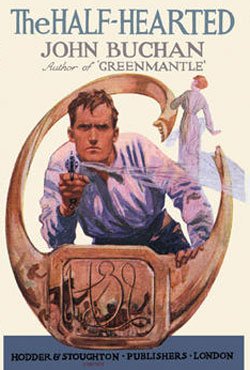
Responding to Ezekiel Emanuel’s “I Want to Die at 75” Atlantic essay, Andrew Sullivan wonders: What Is the Best Way to Die?
John Buchan did an excellent job, I think, of describing the best possible death in The Half-Hearted (1900): Lewis Haystoun dying in the course of single-handedly delaying the Russian invasion of India at a narrow pass in the Hindu Kush, rifle in hand.
The fire died down to embers and a sudden scattering of ashes woke him out of his dreaming. The old Scots land was many thousand miles away. His past was wiped out behind him. He was alone in a very strange place, cut off by a great gulf from youth and home and pleasure. For an instant the extreme loneliness of an exile’s death smote him, but the next second he comforted himself. The heritage of his land and his people was his in this ultimate moment a hundredfold more than ever. The sounding tale of his people’s wars, one against a host, a foray in the mist, a last stand among the mountain snows, sang in his heart like a tune. The fierce, northern exultation, which glories in hardships and the forlorn, came upon him with such keenness and delight that, as he looked into the night and the black unknown, he felt the joy of a greater kinship. He was kin to men lordlier than himself, the true-hearted who had ridden the King’s path and trampled a little world under foot. To the old fighters in the Border wars, the religionists of the South, the Highland gentlemen of the Cause, he cried greeting over the abyss of time. He had lost no inch of his inheritance. Where, indeed, was the true Scotland? Not in the little barren acres he had left, the few thousands of city-folk, or the contentions of unlovely creeds and vain philosophies. The elect of his race had ever been the wanderers. No more than Hellas had his land a paltry local unity. Wherever the English flag was planted anew, wherever men did their duty faithfully and without hope of little reward, there was the fatherland of the true patriot.
The time was passing, and still the world was quiet. The hour must be close on midnight, and still there was no sign of men. For the first time he dared to hope for success. Before, an hour’s delay was all that he had sought. To give the north time for a little preparation, to make defence possible, had been his aim; now with the delay he seemed to see a chance for victory. Bardur would be alarmed hours ago; men would be on the watch all over Kashmir and the Punjab; the railways would be guarded. The invader would find at the least no easy conquest. When they had trodden his life out in the defile they would find stronger men to bar their path, and he would not have died in vain. It was a slender satisfaction for vanity, for what share would he have in the defence? Unknown, unwept, he would perish utterly, and to others would be the glory. He did not care, nay, he rejoiced in the brave obscurity. He had never sought so vulgar a thing as fame. He was going out of life like a snuffed candle. George, if George survived, would know nothing of his death. He was miles beyond the frontier, and if George, after months of war, should make his way to this fatal cleft, what trace would he find of him? And all his friends, Wratislaw, Arthur Mordaunt, the folk of Glenavelin, no word would ever come to them to tell them of his end. …
For in this ultimate moment he at last seemed to have come to his own. The vulgar little fears, which, like foxes, gnaw at the roots of the heart, had gone, even the greater perils of faint hope and a halting energy. The half-hearted had become the stout-hearted. The resistless vigour of the strong and the simple was his. He stood in the dark gully peering into the night, his muscles stiff from heel to neck. The weariness of the day had gone: only the wound in his ear, got the day before, had begun to bleed afresh. He wiped the blood away with his handkerchief, and laughed at the thought of this little care. In a few minutes he would be facing death, and now he was staunching a pin-prick.
He wondered idly how soon death would come. It would be speedy, at least, and final. And then the glory of the utter loss. His bones whitening among the stones, the suns of summer beating on them and the winter snowdrifts decently covering them with a white sepulchre. No man could seek a lordlier burial. It was the death he had always craved. From murder, fire, and sudden death, why should we call on the Lord to deliver us? A broken neck in a hunting-field, a slip on rocky mountains, a wounded animal at bay, such was the environment of death for which he had ever prayed. But this; this was beyond his dreams.
And with it all a great humility fell upon him. His battles were all unfought. His life had been careless and gay; and the noble commonplaces of faith and duty had been things of small meaning. He had lived within the confines of a little aristocracy of birth and wealth and talent, and the great melancholy world scourged by the winds of God had seemed to him but a phrase of rhetoric. His creeds and his arguments seemed meaningless now in this solemn hour; the truth had been his no more than his crude opponent’s! Had he his days to live over again he would look on the world with different eyes. No man any more should call him a dreamer. It pleased him to think that, half-hearted and sceptical as he had been, a humorist, a laughing philosopher, he was now dying for one of the catchwords of the crowd. He had returned to the homely paths of the commonplace, and young, unformed, untried, he was caught up by kind fate to the place of the wise and the heroic.
24 Sep 2014


Beta Theta Pi fraternity house at Wesleyan.
AP:
Wesleyan University in Connecticut on Monday ordered its fraternities with houses on campus to become coeducational within three years, a move it says is not just about bad behavior but also equality.
Wesleyan follows Trinity College in Hartford, which began the transition starting in 2012, citing problems with drinking and drug use in Greek organizations. It also comes less than a month after Wesleyan closed the Beta Theta Pi fraternity house after a woman attending a party there was seriously injured after falling from a third-floor window.
But school spokeswoman Kate Carlisle said the changes are not a response to any one incident.
“This has been the subject of ongoing concern and discussion among the people in the administration, the school community, the alumni community and so forth for a number of years,†she said.
The decision was announced in a letter to the university community from President Michael Roth and trustees Chairman Joshua Boger. It requires Greek organizations with houses on campus to have both male and female members and to have each gender “well represented†in their organizational leadership to qualify for housing on campus and the use of university spaces.
—————————-
HuffPo:
Meanwhile on Sunday night, Dartmouth College students had received word that all fraternities at the Ivy League school in New Hampshire would eliminate the traditional pledge period, which nationwide has been associated with the hazing of new members. …
Dartmouth’s change follows years of debate about the role of fraternities on campus and comes just months after a majority on a student council overseeing sororities boycotted the midwinter rush because they believed the Greek system was unsafe for women. Hundreds of faculty members and two former Dartmouth presidents have advocated for a dramatic overhaul or abolition of the Greek system.
On Sunday, the Dartmouth Inter-Fraternity Council sent out a brief email to students announcing the latest change:
We, the Inter-Fraternity Council of Dartmouth, have unanimously elected to bring a formal end to the fraternity pledge period, commonly known as “pledge term.†All newly selected members of IFC fraternities shall be considered full members upon joining a house. New members will enjoy full rights and privileges of current members. We will continue to work closely with GLOS [the Office of Greek Letter Organizations and Societies] to ensure the continuation of constructive individual and team-building activities.
It is the hope of the IFC that the formal end of the fraternity pledge period will work to strengthen the Dartmouth community we hold dear.
Members of the Inter-Fraternity Council declined to make anyone available for interviews on Monday. But the council’s decision likely grew out of college President Phil Hanlon’s effort, launched in April, to “move the college forward” and tackle social climate problems on campus. Many online responses to that campaign had suggested requiring significant reforms to the Greek system.
College now cost roughly $60,000.00 a year plus your freedom of thought and association.
24 Sep 2014

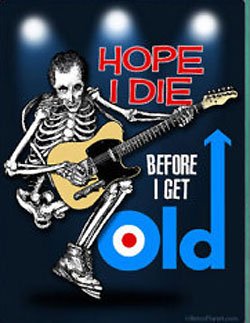
It’s too late already for some of us.
Damon Linker read Ezekiel J. Emanuel’s Atlantic essay, Why I Hope to Die at 75, and it reminds him of certain last century lines of thought no longer held in great esteem.
Ezekiel J. Emanuel, 57, [Rahm Emanuel’s older brother –JDZ] wants to die 18 years from now. We know this because he’s told us — in the title of an essay that’s received an enormous amount of attention since it appeared on the website of The Atlantic last Wednesday.
“Why I Hope to Die at 75” is one of those essays that will spark a nationwide conversation and debate. But that doesn’t mean it’s smart. On the contrary, given the author’s prominence in the world of health-care policy — he played a major role in designing ObamaCare, contributes frequent health-care-related op-eds to The New York Times, directs the Clinical Bioethics Department at the National Institutes of Health, and heads the Department of Medical Ethics and Health Policy at the University of Pennsylvania — what’s most noteworthy about the essay is its stunning combination of wisdom and insight with moral idiocy. …
Reading Emanuel’s essay, I began to despair — not just about the moral outlook it expresses, but about whether its readers will even recognize how monstrous it is. Emanuel has taken the ethic of meritocratic striving that currently dominates elite culture in the United States and transformed it into a comprehensive vision of the human good. Viewed in its light, the only life worth living is one in which you endlessly, relentlessly strive to look as smart and clever as possible in the eyes of other smart and clever people. The ultimate goal of such a life is to be considered the smartest and cleverest person of all. Once old age or any other misfortune gets in the way of continually striving for that goal, one might as well cease to exist.
But what about everyone else? This includes the millions upon millions of Americans who don’t help to write major pieces of legislation, don’t pen op-eds for leading newspapers, don’t run departments at the NIH, and don’t head institutes at Ivy League universities. … The Emanuel brothers have clawed their way to the very top of the American elite. … Doesn’t a middle manager toiling away in an anonymous office on the outskirts of Des Moines — let alone a burger flipper earning the minimum wage at a McDonald’s down the road — possess far less intelligence, talent, and ambition? Isn’t he comparatively disabled? And if so, shouldn’t he hope to die right now rather than waiting for 75?
This isn’t just an academic question. Emanuel and his striving siblings have an adopted sister named Shoshana who suffers from cerebral palsy. The clear implication of Emanuel’s argument is that her life — like that of someone who endures a steep decline in old age — is not worth living. …
Though he would no doubt blanch at the suggestion, Ezekiel Emanuel has written an essay that in its implications clearly amounts to a defense of eugenics. Yet Emanuel’s position differs in one important respect from the version of eugenics that rose to prominence in the Western world in the early decades of the 20th century. Whereas eugenics was originally motivated by public-spirited ends — by the desire to purify the race for the sake of overall human flourishing — Emanuel’s version is provoked by a more personal concern: Extraordinarily creative, intelligent, ambitious, and successful individuals want to be seen and remembered as exemplars of “vitality,” and not as “burdens” slowly succumbing to the “agonies of decline.”
This is eugenics induced by narcissism.
I think myself that it is unquestionably narcissism, narcissism combined with hubristic confidence in the calculative power of human reason and the complete absence of common sense.
Ezekiel Emanuel, who’s got a degree from Oxford in Biochemistry, nonetheless manages to overlook the extreme variability of human heredity and fate and is perfectly prepared to sit in his office, fingertips pressed together, and prescribe the appropriate human lifespan for everyone. Ezekiel Emanuel obviously never met Melvin Poe, who was riding his horse and hunting hounds until very recently at age 94, and who celebrated his birthday last year by putting his horse over a fence.
Human health and lifespan, like human talent and ambition, varies over a quite extreme range. But one thing obviously doesn’t vary: We’re all ready to die 18 years from today. We are just not ready today. 18 years in the future is always a very long time. I feel perfectly sure however that, if the Atlantic checks back with Ezekiel Emanuel come 2032, the editors will find that he has changed his tune dramatically.
/div>

Feeds
|















